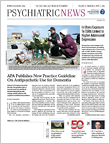On May 1, APA released its latest set of evidence-based recommendations with the publication of its Practice Guideline on the Use of Antipsychotics to Treat Agitation or Psychosis in Patients With Dementia.
This new guideline represents a departure from the existing collection of APA practice guidelines that discuss treatment options for a disorder or class of disorders. The recommendations in the new guideline are tailored to a specific set of symptoms and a particular class of medication.
The topic may be narrow, but the implications are broad. There is an ever-growing population of patients who need to be treated for a variety of cognitive and behavioral difficulties and are frail and vulnerable due to their age and dementia.
Of the symptoms presented by these patients, agitation and psychosis are among the most debilitating; they are the leading risk factors for institutionalization and death in this population, according to the guideline. There is evidence that antipsychotics can alleviate these symptoms, but research suggests they provide only modest benefits and carry potential adverse health reactions.
“There are patients with dementia for whom the use of antipsychotics is warranted, but there is no easy way to determine those cases up front,” said Laura Fochtmann, M.D., a professor of psychiatry at Stony Brook University School of Medicine and the medical editor of APA’s practice guidelines.
With this new guideline, she continued, APA aims to provide rigorously reviewed, up-to-date evidence to help clinicians and caregivers make decisions that are as informed and thoughtful as possible.
The guideline covers a range of topics within the umbrella of antipsychotic usage in this population, including parameters for assessing patient symptoms and the risk/benefit ratio of medication, followed by several recommendations related to the dosing, duration, and monitoring of antipsychotic therapy.
In line with health concerns of antipsychotic use among senior patients, the practice guideline stresses the importance of clinicians’ being judicious about these medications. As a case in point, the recommendations note that antipsychotics should be tapered within four weeks if no clinically meaningful response is observed; while in patients who do respond, antipsychotics should be tapered within four months of initiation.
In addition, one of the key recommendations is that a long-acting injectable antipsychotic should not be used unless it is needed for a co-occurring chronic psychotic disorder.
While the focus of this guideline is antipsychotic therapy, it emphasizes that any such medication given to dementia patients should be just one part of a comprehensive treatment plan that is person-centered and includes appropriate pharmacological and nonpharmacological interventions.
“One should not make any decision concerning the initiation or discontinuation of an antipsychotic in a vacuum,” Fochtmann said.
As with last year’s release of the updated Practice Guidelines for the Psychiatric Evaluation of Adults (
Psychiatric News, August 7, 2015), this publication follows the standards set forth in a 2011 Institute of Medicine (IOM) report titled “Clinical Practice Guidelines We can Trust.”
Developed in response to perceptions that practice guidelines across health disciplines were somewhat inconsistent and occasionally affected by potential conflicts of interest, the IOM set a process that adhered to high standards in regard to composition of the guideline writing groups, management of potential conflicts, transparency of the review process, and synthesis of the available evidence.
In addition, the new guideline includes an Expert Consensus Survey to supplement the expertise of the Guideline Working Group. It was developed by Joel Yager, M.D., a professor of psychiatry at the University of Colorado School of Medicine. The Expert Consensus Survey—also known as a “snowball survey”—was sent to psychiatrists regarded as experts on the treatment of agitation or psychosis in people with dementia. They were asked to provide input on therapeutic strategies as well as nominate other experts they knew.
The members of the working group include Victor Reus, M.D. (chair), Laura Fochtmann, M.D., A. Evan Eyler, M.D., M.P.H., Donald Hilty, M.D., Marcela Horvitz-Lennon, M.D., M.P.H., Michael Jibson, M.D., Ph.D., Oscar Lopez, M.D., Jane Mahoney, Ph.D., R.N., Jagoda Pasic, M.D., Ph.D., Zaldy S. Tan, M.D., M.P.H., Cheryl Wills, M.D., Richard Rhoads, M.D., and Joel Yager, M.D. ■
APA’s Practice Guideline on the Use of Antipsychotics to Treat Agitation or Psychosis in Patients With Dementia can be accessed
here. The IOM report “Clinical Practice Guidelines We Can Trust” is available
here.
